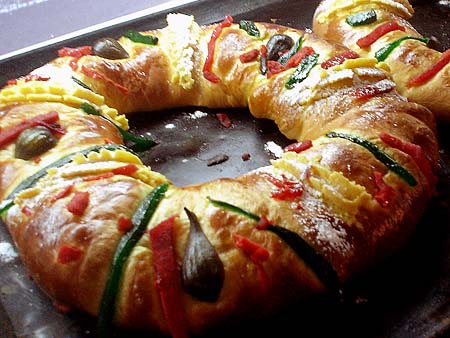Unlike the USA and Canada, where gifts are usually exchanged on Christmas Day (25 December), the original tradition in Mexico over the Christmas season was to exchange presents on Three Kings Day (Día de los Reyes, 6 January). In the Christian calendar, 6 January marks the Feast of the Epiphany, the day when the magi arrived in Bethlehem with their gifts for the infant Jesus. In homage to this occasion, Mexican children would dutifully stuff the largest shoes (or box) they could find with straw, and leave them outside their bedroom door on the night of 5 January, in anticipation of finding new toys the following morning.
Three Kings Day is still very much a family day throughout Mexico. In the late afternoon or early evening, it is traditional for the whole family to share a rosca. Roscas are ring-shaped loaves of sweet bread, sold to be eaten on special occasions. The roscas for Three Kings Day each contain a small muñeco (doll). These muñecos were originally ceramic, but are now more usually plastic. The recipient of the piece of rosca containing the muñeco has to throw a party on 2 February (Candlemas day, Día de la Candelaria) for all those present at the sharing of the rosca. It is customary to provide tamales to feed everyone gathering on Candlemas day.
- Los Tamales – 500 years at the heart of the fiesta (Karen Hursh Graber, MexConnect)
Cristina Potters’ outstanding blog Mexico Cooks! includes a comprehensive account of the significance of the cuisine associated with Three Kings Day and Candlemas Day,
In the 20th century the Three Kings Day tradition in some regions of Mexico broke down in the face of the enormous consumer-oriented publicity from north of the border, which stressed Christmas (rather than Epiphany) gifts. Some especially greedy Mexican middle- and upper-class children claim that their parents and grandparents should not only preserve the old customs but also embrace the new version, and therefore hope to receive gifts on both days!

Sorry, the comment form is closed at this time.